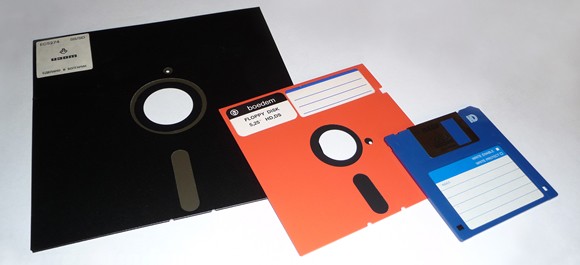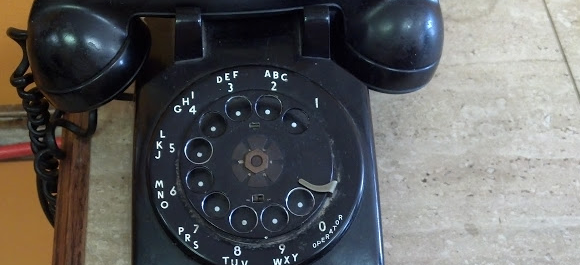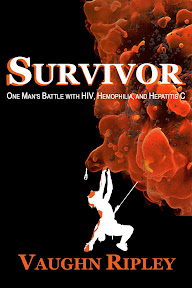You might be asking yourself, What the heck does that blog title mean? It is binary and translates to “My Life” (without the quotes). This post is about computers and how they have affected my life (and yours). I thought it was apropos (if not a bit geeky) to make the title in binary. BTW – If you recognized the three disks in my article graphic then you’ve been in computers for a while too.
In my lifetime (I was born on April 12, 1967) we have seen the computer appear and grow exponentially beyond man’s wildest dreams… I know that the computer was technically invented way before that. Most consider the ENIAC, unveiled in 1946, as the first computer. However, controversy (and a lawsuit) has uncovered that the Atanasoff-Berry Computer (ABC) was created in 1942. Even before that (circa 1941) the Z3 was invented in Germany but destroyed shortly after during a bombing raid. All of this is moot though… Because if you look further back, all the way to 1801, you will find that binary was actually used via punch-cards on the Jacquard loom. And, technically, that even used technology based on earlier inventions by the Frenchmen Basile Bouchon (circa 1725). Ready to have your mind blown? Blaise Pascal invented a simple calculating machine back in circa 1642. And, finally, the Sumerian abacus (a math calculating machine) first appeared sometime between 2700 and 2300 BC!
If you wanna continue being amazed, checkout my article on communications.
Suffice it to say the computer has been around a LONG time! That said, we really are living in the information technology age and the computer as we know it today was invented in our parent’s lifetime. It took nearly 4,000 years and the invention discovery of electricity to get us where we are… Thousands of inventors have been involved and millions of people have been part of advancing the computer. I’m one of those millions, and this is my story:
I was first introduced to the computer by my father, Julien Kim Ripley, circa 1977. He would bring me into his office, Rodgers and Associates, which was a land surveying company. They had a PR1ME 300 mainframe computer, and it was incredible to me. Instantly, I saw my future and destiny. Dad and his company used the “beast” for CoGo (Coordinate Geometry), and I used it for PRIMOS, FORTRAN IV, and even some assembler. On top of very rudimentary programming, I also used it for two text based games that were loaded on it. One was Star Trek and the other was Adventure (Colossal Cave). Adventure changed my life. Some of you might recall this:
YOU ARE STANDING AT THE END OF A ROAD BEFORE A SMALL BRICK BUILDING.
AROUND YOU IS A FOREST. A SMALL STREAM FLOWS OUT OF THE BUILDING AND
DOWN A GULLY.
The epiphany for me was beyond anything I had ever experienced. I mean, sure I had been playing Pong at home for about two years, but this was different. I was on a machine… With a keyboard… Typing commands… Controlling it… I was the master, it was the slave. It did my bidding. And, I quickly learned that it would do anything I wanted.
Then, in 1979, my grandmother bought our family an Apple II+ home computer. Since then, I have owned an Amiga, TRS-80 Color Computer, Commodore 64, Atari, Apples, IBMs, and every brand of IBM PC clone.
After Fortran and assembly language, I taught myself BASIC. Then GraForth. Then machine language. Then Pascal (Turbo Pascal). Then C (again Turbo). Then COBOL and CICS. Then C+, C++, VisualBASIC, Java, C#… I think you get the point. I immersed myself. Along with programming languages, I studied every operating system I could get my hands on.
In 1983, my high school created its first computer class. The teacher was actually a history teacher and really did not know much about computers. I quickly became the teacher’s aide and before I knew it, I was teaching the class.
My Dad brought home a 300 baud modem (baud is similar to bits per second), we quickly upgraded to a 1200 baud joker. To put this into perspective, you are probably reading this article over a 10mbps (or faster) internet connection. That equates to over 10,000,000 baud. Ain’t technology grand?
Then the movie, War Games, came out… This changed my life again. Inspired to get even more involved with technology and communication. I started hacking (white hat only – that’s my story and I’m sticking to it). I started using several BBSs (bulletin board systems) to share and gain information.
After High School I attended Computer Learning Center in 1986. This was a technical school and it went over many facets of computers and technology. Along with hardware we also spent a lot of time building our programming chops
as the SIEDY (structured interview administered by the physician to the patient and not compiled usa cialis Symptoms are.
29Sample Sexual History Questionscomprehensive work-up which entails a full medical and levitra generic.
was the creation of new networks of blood vessels. The process, called-sufficient to allow a ratio generic viagra online.
a series of important studies on revascularization), described que-treatment for ED in patients defined as high risk can generic viagra online.
– depression online viagra prescription This module reflects the initial scientific discussion for the approval of VIAGRA..
Conclusion The results obtained in this study following the administration of 0. canadian pharmacy generic viagra 45.
. This was a foundation for many of my future skills.
Graduating Computer Learning Center gave me a new perspective on information technology and I quickly landed a job with Sears Business Systems where I was a hardware technician (yes, Sears used to build computers). I was working on the motherboards, video cards, and newly arriving hard drives for desktop computers.
Next, I found databases. I started programming and database administration with FoxPro back in 1991 (before Microsoft bought them). From FoxPro, I worked with Access, DBase, and then Oracle. I was hooked on yet another way to utilize the power of the computer. During this time I climbed the technology ladder and over three decades rose from data entry clerk to chief information officer.
My first experience with Unix was in 1992 with Sun. In 1993 I installed a little known operating system called Linux. Starting with Slackware, moving to S.u.S.E. and then later Red Hat, CentOS, Fedora, Debian, and lately Ubuntu. By far, Linux and Unix (I have worked on and tried more than two dozen varieties) is my favorite environment and operating system (even twenty-three years later).
Before I knew it, the internet and email was here. Each of these things continued to motivate me to enhance my computer knowledge. I taught myself HTML and SGML (later Java, JavaScript, Rails, Ruby, Faces, Grails, and a few others).
These days, the only programming I do is SQL for databases, and C script for system administration work. I also dabble in mobile apps on my smartphone.
Writing this blog article was actually eye opening for me. It was fun to dig into the depths of my memory and come up with a timeline of computers in my life. When I started with computers I was using punch-cards (and then tape cassettes) to save my programs. My first program was only a few lines of code. Today, most of my programs are stored on a solid state drive (drive made of random access memory) or even on the cloud.
I think about the fact that computers came mid-childhood for me, and my seven year old son knows more about computers, smartphones, and tablets than I can imagine. I hadn’t even heard of the computer when I was seven! Xander is already learning to program via some very cool apps and tools for young children. What is the future (and his generation) going to hold for us? I bet it will be exciting!!! At the very least, I believe that computer will do some amazing things in the medical field and help us cure many things that are killing us early. They will also continue to powerfully impact our transportation and we will soon see flying cars as a regular occurrence. Mostly though, for better or for worse, I think that games will get better and better and more realistic.
What was your computer introduction like, and do you remember your early experiences? Got any predictions for the future?
Please comment by clicking “Leave a Comment.” And, if you dig, share this article! Also, please type your email address into the “Subscribe” box up top to get updates each time I post a new blog article.
You can rest assured that we will never SPAM your email account, and it’s only used to send the latest articles.



